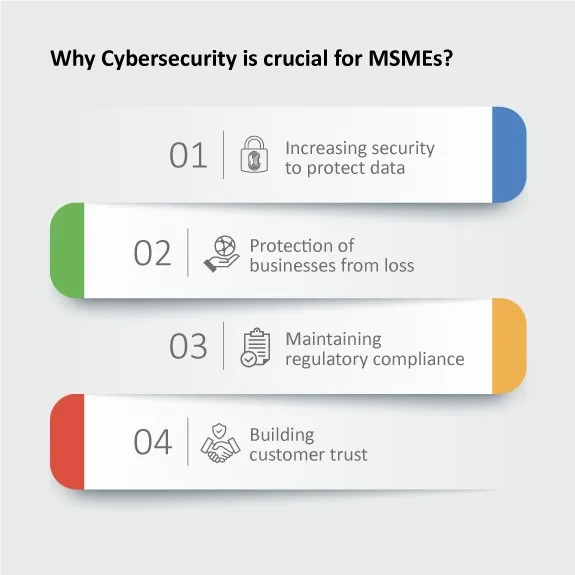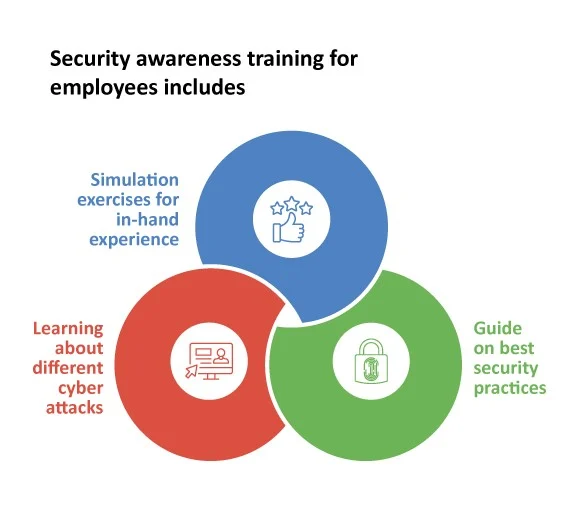With the start of digitization, MSMEs in India are tapping into digital technologies and innovation to enhance their competitiveness and resilience. However, with the rise of technological adoption, cybersecurity has become a safety concern for MSMEs in the digital era. This blog discusses the importance of cybersecurity management and how MSMEs can protect their businesses with proactive cybersecurity practices.
Digitization has become a significant force driving the development and transformation of Micro, Small, and Medium Enterprises (MSMEs) in India. Over the years, MSMEs have increased their digital footprint to instil transparency, accountability, and competitiveness. In 2024, approximately 7.7 million MSMEs in India have achieved digital maturity, and almost 60% of MSMEs are planning to digitize their operations by 2025.
Adopting advanced technologies is now deemed as a hallmark of a successful MSME. However, with the increased reliance on digital technologies, cybersecurity has become a critical concern for MSMEs. The lack of proactive cybersecurity practices and robust defence measures has led to the rise in cyber fraud, specifically targeting MSMEs. As a result, prioritizing cybersecurity to safeguard their operations and reputation has become the need of the hour for these businesses.
In this blog, we will explore the critical importance of cybersecurity in today’s digital landscape and discuss how MSMEs can enhance their cybersecurity defences and protect their business from the emerging digital challenges.
What is the importance of cybersecurity and potential threats?
Cybersecurity refers to the practices, technologies, and processes designed to protect systems, networks, and data from cyber threats, attacks, or unauthorized access. Cyber-attacks can have serious business and financial risks for organisations of all sizes and across all industries. A single attack can cripple confidentiality and integrity, creating a catastrophic impact on an organisation’s reputation, finances, and trust with stakeholders. Thus, it is essential for businesses to stay vigilant against cyber-attacks. Here are some of the most prevalent cyber threats that demand attention -
- Ransomware : Ransomware is a form of malicious software which infects the company’s system, encrypts critical files, and demands ransom to unlock them. Many MSMEs without strong backup solutions have fallen prey to ransomware attacks, facing devastating consequences. According to a study by NASSCOM, around 68% of Indian SMEs reported being targets of ransomware attacks in the past year.
- Phishing attacks : Phishing attacks are one of the common cyber threats targeting MSMEs. In a phishing attack, cybercriminals send texts or fraudulent emails pretending to appear from legitimate organizations or trusted partners, such as banks or credit card companies. Spam emails or text messages often contain an attachment or malicious links that can steal sensitive information, putting your business at risk. Medium and small enterprises can be easy targets of phishing scams due to insufficient security and lack of resources.
- Social engineering : Social engineering is a form of cyber-attack that manipulates people instead of directly attacking computer systems. Cybercriminals target the weakest link in the security chain and trick employees into divulging sensitive information or performing actions that compromise the company's security. Once inside, they can access sensitive data or disrupt operations across the supply chain. Social engineers employ various tactics such as pretexting, baiting, or quid pro quo, to attack MSMEs.
- Cloud cyber-attack : Any cyber-attack that targets off-site service platforms that offer storage, computing, or hosting services via their cloud infrastructure can be classified as a cloud cyber-attack. As MSMEs increasingly adopt cloud services due to their cost-effectiveness and flexibility, they become more vulnerable to such threats. Common security lapses such as weak security configurations, lack of multi-factor authentication, or improper cloud access management often expose them to such risks.
- Supply chain attacks : Supply chain attacks seek to damage an organisation by targeting the less secure elements in the supply chain. As MSMEs often outsource their data to third-party vendors to store and process critical information about their business, cybercriminals often try to penetrate the third party’s defences or program a loophole into a solution offered by a vendor to attack the system. Companies that use smaller third-party vendors are particularly vulnerable to supply chain attacks.
Did you know?
The month of October is globally observed as the National Cyber Security Awareness Month (NCSAM) , with the aim to increase cyber security awareness among people, businesses, and organisations and how to protect their online presence.
Cyber security significance for MSMEs
As most MSMEs are at the transition phase of embracing digital transformation, the risk of cyberattacks is also increasing significantly. With minimal resources at their disposal, MSMEs are particularly susceptible to these threats. Therefore, it is crucial for these businesses to adopt cybersecurity for the following reasons -

- Increasing security : One of the primary reasons MSMEs need to invest in cybersecurity is to protect their sensitive data, including crucial customer and third-party information, financial records, and proprietary intellectual property. Fortunately, this threat can be mitigated with adequate cyber protection and effective measures, allowing the safety and growth of all business stakeholders.
- Protection of businesses from loss : MSMEs are increasingly vulnerable to confidentiality threats, which can result in substantial business loss. This loss often stems from data recovery costs and operational downtime. Implementing effective cybersecurity measures is crucial to ensure the long-term sustainability of the business.
- Maintaining regulatory compliances : MSMEs are accountable to various regulatory compliances that require them to maintain specific security standards to protect their customers’ data. Failing to comply with these requirements can result in significant fines and penalties. Thus, investing in cybersecurity helps businesses stay compliant with these regulations, avoiding potential legal issues and penalties.
- Building trust : Customers are increasingly becoming aware of the importance of data protection. By adopting a strong and effective cybersecurity framework, MSMEs can build trust and strengthen the business's reputation, increasing customer retention and loyalty.
Effective cybersecurity strategies for MSMEs
MSMEs must adopt an effective cybersecurity and risk management strategy to tackle cyber-attacks. Here are some crucial actions that can improve a company’s security :
1. Key cybersecurity strategies
- Risk assessment : To protect against cyberattacks, MSMEs should conduct a comprehensive risk assessment to identify potential threats, vulnerabilities, and their impact on the organization. This process involves evaluating the business’s entire digital infrastructure, from networks and software to data storage. By detecting where the most significant risk lies, MSMEs can prioritize security efforts, allocate resources, and mitigate vulnerabilities before they are exploited.
- Data encryption : Another effective security strategy is encrypting sensitive data stored on physical or cloud storage and data in transit. Encryption converts data into unreadable format and adds multiple layers of security, making it more difficult for unlawful parties and attackers to access sensitive information. This process secures data from potential breaches and enhances overall security of your systems.
- Security policies and procedures : Security policies and procedures are vital for an effective cybersecurity strategy. They provide a structured approach to safeguard an organisation’s digital assets and guide employees to obtain sensitive information, identify potential risks, and react to security incidents. These policies also create guidelines around password management, access control, and train employees to recognize threats and reduce human errors.
- Third party risk management : Third party risk management is another key strategy MSMEs should consider in combating cybercrimes. It involves identifying, assessing, and mitigating cybersecurity risks posed by third party suppliers with access to an organisation's systems or data. Without this thorough assessment, third parties can cause damage to the organisation’s security. Thus, MSMEs should regularly assess internal controls, conduct external risk monitoring, and evaluate the third party vendor’s performance management to ensure compliance, follow safe practices, and mitigate potential risks.
2. Essential approaches to implement cybersecurity strategies
- Investing in cybersecurity tools : Investing in cybersecurity tools is necessary for businesses that rely on information systems. Cybersecurity tools like firewalls, anti-virus software’s, and encryption protect digital assets from cyber threats.
- Collaborating with security experts : Collaborating with cybersecurity experts is another effective strategy as they provide valuable insights into the latest security trends and help businesses stay ahead of emerging risks. These security experts also play a critical role in assessing the company's vulnerabilities, training employees, providing tailored solutions and practical advice on safeguarding the company’s digital assets.
Importance of training employees on cyber security
Employee training is another critical aspect of the effective cybersecurity strategy required for MSMEs. Keeping cyber threats in view, companies must train and educate employees about key topics related to cybersecurity practices, potential threats, and specific protocols to safeguard the system. Workshops, simulation exercises, and providing access to online courses can be good training materials for MSME employees to remain vigilant.

- Continuous audits and reviews : With continuous audits and reviews of the security measures, MSMEs can identify their vulnerable gaps and potential points of failure. This proactive approach enables organisations to address security lapses, identify emerging threats, enhance protective measures, and improve resilience against cyber threats.
What is the need of cyber security
Cybersecurity has become a critical asset for MSMEs embracing digital transformation in recent times. To sustain in the competitive digital economy and safeguard their operations, it’s important for MSMEs to invest in robust security measures, implement the right strategies, and seek expert collaboration.
To learn more and be a part of our growing community, Register on TCS iON BizHub today.
